#autistic camouflaging
Text

ASDマルチタスク構造化の困難でうまくいかぬ事重なり自閉症スペクトラム感覚過敏な環境感受性の過負荷な処理やマスキング擬態化カモフラージュせねばの過緊張高不安も伴って不快感の正体が不明で更に不安なA型作業所仕事通所。大人の発達障害アスペルガー/自閉スペクトラム症の月1直近精神科通院庶幾い
#snapseed#autism spectrum disorder#high functioning autism#multi tasking#hypersensitivity#autistic masking#autistic camouflaging#high anxiety#very nervous#就労継続支援a型事業所#精神科通院
0 notes
Text

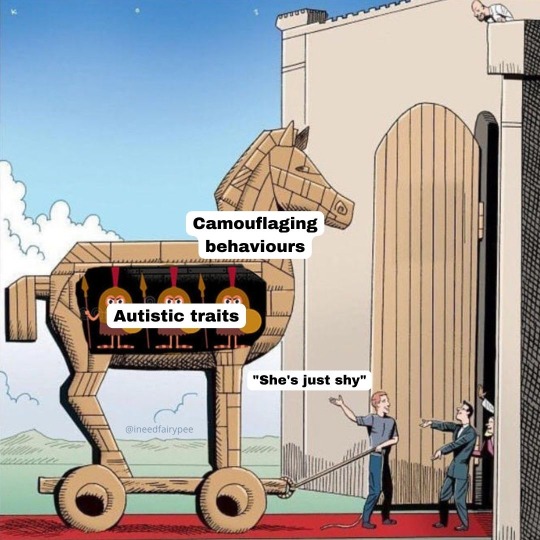
Aww she's shy 🙈
#autism memes#autism meme#autistic memes#camouflaging#autistic masking#autism things#autistic problems#autistic women#autistic girls#i'm shy#autism in women#undiagnosed autistic#autism in girls#late diagnosed autistic#autistic adult#autistic woman#autistic girl#shy#late diagnosis#neurodivergent#autism#actually autistic#autism diagnosis#undiagnosed autism#girls with autism#women with autism#autism spectrum#psychology#psychology memes#ineedfairypee
287 notes
·
View notes
Text
Hi everyone,
I found an interesting study on females with autism and how tools are more male-based tools. According to this study:
An Australian-first study from Flinders University has found women and girls are harder to diagnose with autism than boys, because diagnostic tools are skewed towards detecting autistic boys and men.
The researchers found autistic girls and women often mask their traits and are not being diagnosed until later in life, if at all, meaning they miss out on important supports.
"The tools we currently use are not well-equipped to diagnose autism in females and we need to go back to the drawing board to work out how girls with autism present and how different they might be from ... boys," Professor Robyn Young said.
"If we've got a stereotypical view of what autism looks like and a female comes in with really good social scripts, good eye contact, engaged in pretend play, their obsessive interest is Harry Styles, they might not appear to be so different from any other female."
"Boys will often externalise their behaviours and become more obvious in the classroom, acting out and having meltdowns.
"Girls are more inclined to camouflage ... and as a result they don't come to the attention of professionals until much later."
The full article will be below for anyone who wants to read it.
#autism#actually autistic#autism in women#camouflage#masking#outdated tools#feel free to share/reblog#if you’re neurodivergent feel free to reblog
109 notes
·
View notes
Text
Deep compensation in Autism spectrum disorder (ASD)
I recently read about a particular thing people on the spectrum do that is rarely spoken about (when comparing to masking) and gets in the way of pople getting a formal asd diagnosis: deep compensation.
Livingst and Shah (2019) and Livingst et. al (2020) have written about it (links go to open access papers) and showed how it can disguise autism.
I'll share some quotes, from those papers, that I found interesting.
However, it is likely other, more sophisticated strategies involving deep compensation exist, such as detail-focused analysis of social information, which might allow a person to solve ToM and have fairly flexible social understanding, albeit via an atypical route.
We have previously hypothesised that these may be distinct from deep compensatory strategies, which work flexibly across contexts, because they provide an alternative route to the social-cognitive ability in question (e.g. theory of mind), for example, using complex mental algorithms to predict other people’s thoughts and feelings.
This would be akin to a visually impaired person using echolocation; the strategy does not simply circumvent the impairment like a white stick does, but provides an alternative way to form a spatial representation that enables navigation skills.
Strategies that enable an alternative route to solve the cognitive difficulty in question (e.g. successfully solve theory of mind, albeit differently to neurotypical people): Flexibly use built catalogue of possible interpretations of others’ mental states, based on a combination of multiple sources of information (e.g. logic, context, facial expression, tone of voice); substitute others’ values/interests with your own or those of a TV/book character to infer their mental state
When it comes to how asd are presented esp in afab individuals, camouflaging or masking is something that is often present. (You can test here if you score high or low on these, link goes to the CAT-Q test), in a nutshell the following table describes what each behaviour is:
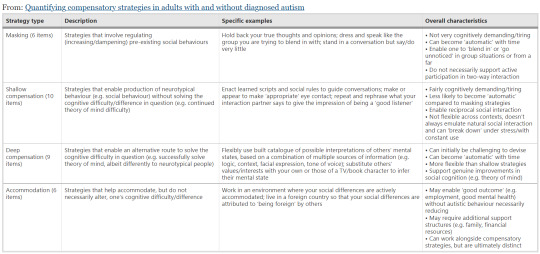
I have already come across most of this online (or in books) when reading about masking, but deep compensation strategies - in which a person can use a different part of the brain to perform a function, often solving intellectually what most people solve by instinct - were a new concept to me and helped me a lot, since it is often co-present with other strategies but was rarely talked about.

(Venn diagrams showing the number of a Diagnosed and b Non-diagnosed participants that reported using masking, shallow compensation, deep compensation and/or accommodation strategies. Overall, participants were more likely to report strategies across multiple types, than a single strategy type. This pattern was broadly similar between the two groups, but there was a significant group difference in shallow compensation)
The biggest take away is that, when this becomes an ingrained habit, people will be able to "understand" social cues and to deduce what people are thinking/feeling (especially when combined with acommodations in the environment) and this can come up as a failure to identify with a few traits people with asd have (but still feel autistic).
Deep compensation (subtheme), involving complex and flexible strategies, contributed to some improvements in social cognition. Some participants reported using pattern detection and internal data modelling (gesture + facial expression + context = particular mental state) to understand others. These strategies, although hard to implement at first, could become “second nature” with time.
To modulate compensatory efforts, many participants described compensating after logically assessing the costs versus benefits (subtheme). For example, compensation was considered worthwhile to make a positive impression towards a friendship, but not for interactions with inconsequential strangers. In superficial interactions, masking was preferred over compensatory strategies to conserve resources.
Compensation typically resulted in a lack of support in adulthood because participants looked “too normal” (subtheme). Employed participants reported that employers and colleagues held them to a neurotypical standard, which resulted in social errors not being interpreted in the context of autism. Because autistic characteristics went undetected by others, many participants reported that it was difficult to request, and they were unlikely to receive, workplace accommodations.
“I think I observe patterns in behaviour and then try to transfer this. So if a person is behaving x/y/z types of ways, they could be feeling or thinking what so and so people had felt. It's almost a case of systematically storing little patterns in each person and the context, so I can refer to it in future.”
There is another quote that I loved but simply cannot find rn. It must be somewhere in the papers or related literature, so I recommend reading it if you are willing. I also found some great charts last night that i can't locate rn.
Personally, I was quite shocked to find out that people take social cues by instinct, because i legit thought everyone deduced what people feel/think and it was second nature to them simply because they had more social interaction and were more at ease around people and therefore social interaction becomes better with time after you learn and become familiar with different behaviours and learn how to react. I thought this was the "normal way" people go through life and some were simply more skilled at it (learning faster and better at deducing). Well, it seems it is not the case. I can't make any good summary of the papers, but I hope the quotes I shared here can help some people as they have helped me.
#asd#actually autistic#masking#accommodation#compensation#deep compensation#theory of mind#autistic adult#late diagnosed autistic#autism#autistic masking#autistic community#camouflage#late diagnosed autism
107 notes
·
View notes
Text
a normal post in miles’s universe would go like “just heard someone crunching on chips. i’m alone in here”
#miles stop giving people heart attacks.#miles randomly chewing while camouflaged is super funny to me bc of how gross and creepy it sounds#<- is autistic and hates any eating sound even my own#miles morales#spiderman#spider man
12 notes
·
View notes
Photo
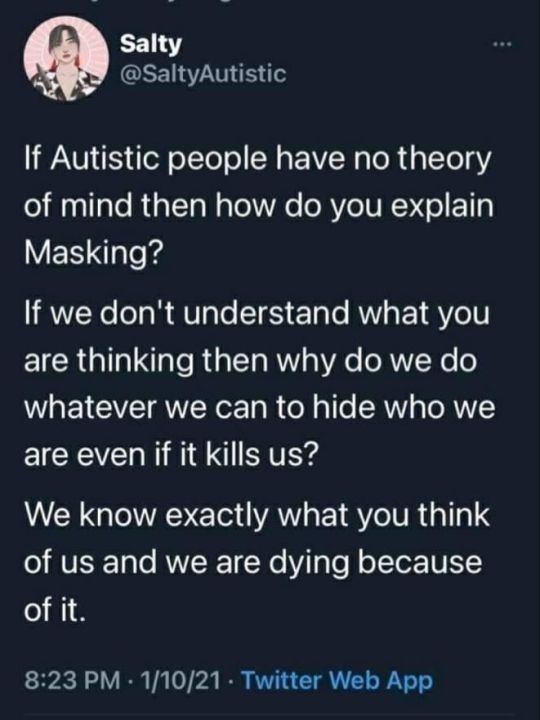
autism and theory of mind?? this is a theory and we’re talking about life experience here!
12 notes
·
View notes
Text
Burnout Recovery Woes
Ups and downs. Hoping to record some stuff this week but we'll have to see.....
#Burnout #BurnoutRecovery #HealingIsNotLinear #AutisticBurnout
Urgh. So, I’m definitely recovering.
Ssssllllooooowwwwwllllyyyyy…….
Have a few good days then a couple of bad ones.
Feel better, do something, feel worse again.
It’s so frustrating.
Healing is not linear
I know logically that healing/recovery isn’t linear but that doesn’t change how grim and upsetting it can be to not know from day to day how many spoons I have.
I’m really hoping to record…
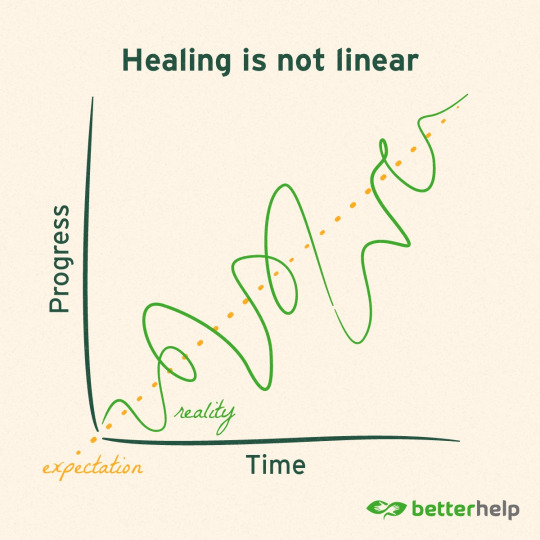
View On WordPress
#Actually Autistic#Autism#Autistic#Autistic Adult#Autistic Adults#Autistic burnout#Autistic camouflage#Burnout#Burnout recovery#Fork theory#Healing#Healing isn&039;t linear#Late Diagnosed#Late Diagnosed Autistic#Recovery#Scripting#Spoon theory#Spoonie#Wellbeing
6 notes
·
View notes
Text
me after not seeing my friends for a long time: oh no my masks are failing what do i do :(
#im not funny nor articulate anymore help#i lost my filter too#autism#actually autistic#autism camouflage
3 notes
·
View notes
Text
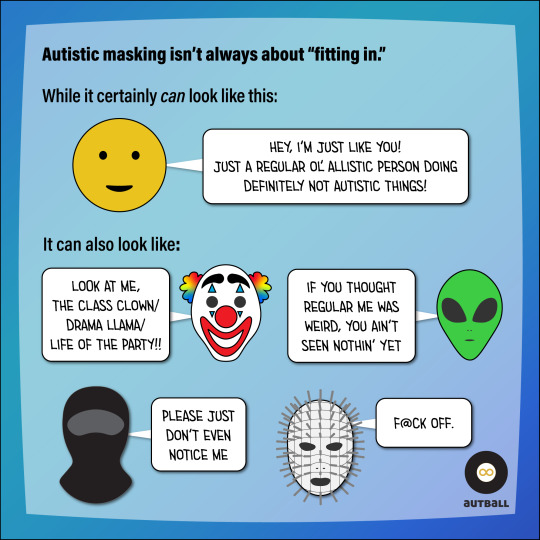
MASKING MYTHS BUSTED: “Masking = Acting NT.”
FALSE.
Autistic masking does not necessarily mean “pretending to be allistic/neurotypical," although you’d definitely be forgiven for thinking it does.
Non-autistic researchers have been referring to it as “camouflaging” for years, framing it as an intentional choice to suppress autistic traits and replace them with allistic ones in order to “blend in.” Doing an internet search on the term will return several similar results.
But now, Autistic researchers are in the game, and their take is much more nuanced and comprehensive than that. (Funny how that happens, isn’t it?)
They’ve found that:
- It CAN be intentional but is often subconscious and involuntary
- It is a protective response to trauma and feeling unsafe
- It is often about suppressing more than just autistic traits
- It is about identity management and being able to predict how people will treat you, not just “blending in”
Some people will lean into being “the bad kid” because they know that’s what people expect of them. Some people will even act “more autistic” because they know that’s what people expect of them. Others still will do things to attract attention in controllable, more “acceptable” ways to avoid attracting attention in unsafe, more stigmatizing ways. Not because they WANT to be that way, but because it lets them predict people’s responses better, which feels safer.
Also, there are Autistic people who can’t “pass” for non-autistic no matter how hard they try. That doesn’t mean they’re not masking. They may actually be working hard to suppress A LOT, they just can’t do everything to neuronormative standards.
None of these people will be accused of “blending in,” yet they are still masking their hearts out. When we assume they are not, we miss all the harm that masking is causing them. But they are suppressing themselves and suffering the consequences of that just as much as any Autistic person whose mask successfully says, “Hey, I’m just like you!”
(For more on this, please see the work of Dr. Amy Pearson and Kieran Rose.)
17K notes
·
View notes
Text
I don't know how to be without my camouflaging.
I find myself building glass brittle arches around us, carrying the weight of the conversation, carefully concealed with translucent panes.
Silly little adventures with near strangers.
Calender reminders to text them back.
"I'm aromantic," met with "I have feelings for you."
My sculpted facade carefully curated: kind, sympathetic, fun, silly, sweet: crafted.
I can't sit back and let myself be. The thing that lies under the glass and sculpture is not what you take out to dinner. It is shifting and sharp. Mindlessly, endlessly, wandering, thinking, sighing, wishing, being.
And the truth? It could be anyone on the other side of the table. I would be content to be here with anyone. Or maybe even, I would be happier here with my best friends.
What a tragedy. What a fucking curse. Cultivated charisma woven through my person as its greatest defense. Soft smiles, giggles, careful confidence, genuine delight. Made for your pleasure.
0 notes
Text
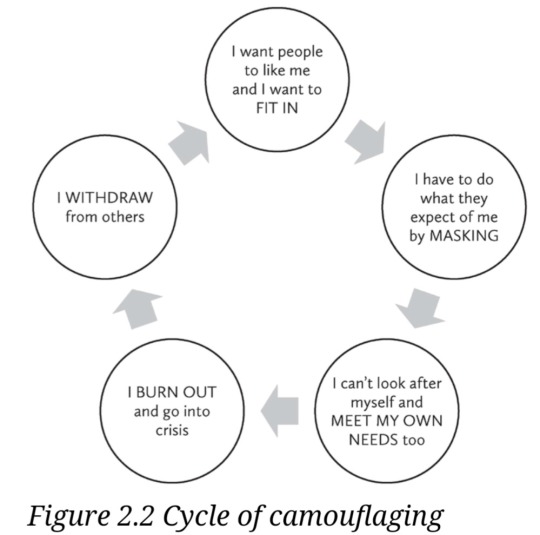

1 note
·
View note
Text

大人の発達障害アスペルガー/自閉スペクトラム症のA型事業所では1人のトイレや時差出勤A型作業所人数激減午後で息抜くもマスキング擬態化カモフラージュ常に過緊張高不安。聴覚過敏小学校からトラウマで自分から音出せず自律神経覚醒度高め。自閉症ASD光るものDSM-5診断基準こだわりstimmingで不安解消
#snapseed#autism spectrum disorder#high functioning autism#high anxiety#very nervous#就労継続支援a型事業所#autistic camouflaging#autistic masking#hyperacusis#childhood memories#traumatic experience#obsessed with lights#fascination with lights#cherry blossoms
0 notes
Text
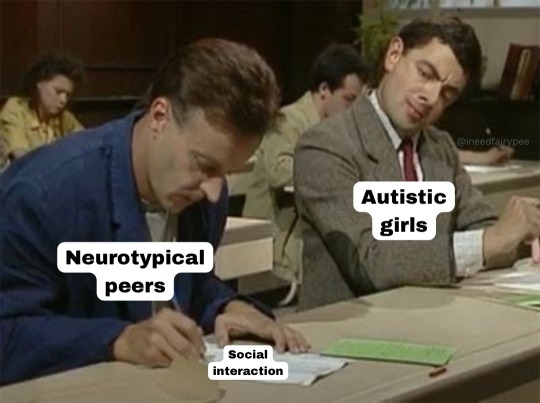
Fake it til you make it
#autism memes#actually autistic#autistic women#autistic girls#autistic problems#autistic life#neurodiversity#autistic things#girls with autism#autism community#women with autism#female autism#autism meme#autistic memes#autistic masking#autism things#autism#autistic community#autistic culture#psychology memes#psychology#autism diagnosis#undiagnosed autistic#undiagnosed autism#late diagnosed autistic#neurodivergent#camouflaging#late diagnosis#autism spectrum#ineedfairypee
321 notes
·
View notes
Text
Things I used to love but stopped (because people!)
• i love snakes, bugs, spiders, all kinds of insects, reptiles, birds, any creatures.. i find them so fascinating and love watching them, sometimes touching them (in a non-harming way) but so many times, family members, friends, even friends at uni were grossed out with my fascination. Especially with bugs, the tiny lil adorable creatures! So i stopped showing my fascination with them, in fact i stopped focusing on the lil creatures and instead focused on the bigger part of nature.. the flowers, landscape, skies etc. Although i do love that part of nature, i still love the smol creatures and bugs, and spiders and snakes even more! Even now, some family members are afraid of all kinds of bugs, insects, moths, and especially snakes. And they know I love bugs, spiders and snakes, but still, their fear always takes the limelight. I understand their fear which is why i don’t talk about the lil creatures with them. But i hate it when they stop me from going around a wild patch of grass to observe/click a bug, or a moth. They might be scared of it, but i am not. I love them and i’m not scared if they bite me! (Gosh, sorry for the venting.) Its frustrating. So i started keeping my love for this part of nature only limited to Tumblr. The bugblr and all the wonderful blogs of snakes, reptiles, bugs, and even frogs. So grateful to all of them.
• i loved waving hands in the air, specially while listening to music/songs i love on repeat. i also used to close my room and dance to express what the lyrics were saying. mainly it was waving hands in different ways, like a motion of wave going up and down. But i stopped it after i had a horrifyingly embarrassing moment with my roommates in college when i trustingly shared them this, and they asked me to dance and they’ll watch. i was excited that finally someone understands, coz one of them had a nice singing voice and the other was good at dancing. so i was doing in front of them what i did in my closed room alone, and while one of them was encouraging and seemed to like it, the other one just laughed and clapped. I still shudder at that memory and i started keeping my distance from them. (i had long forgotten this memory but remembered it as i was alone in the room and my hands were doing the wave motion and it felt good but also embarrassing memories came back!)
#things i used to love but stopped#masking#unmasking#camouflaging#autistic adult#personal#autistic-flower
1 note
·
View note
Text
reminder that i’m so unnoticed in public that a bus driver literally thought i was fare jumping when i flashed my bus pass at him twice but he still was like ‘HEY STOP YOU NEED TO SHOW FARE’ like c’mon.
0 notes
Text
Exploring the link between hypermobility and neurodiversity
Like the princess and the pea, my hypersensitivity to factors that don’t even seem to register to other people means that the kind of bed that greets me when I check in somewhere new is a make or break situation. “Pretty” metal bed frames that creak and otherwise self-animate whenever you move, especially those with a load of wire springs underneath, under compensated for by over soft or springy…

View On WordPress
#actually autistic#adaptability#articles#autism#autistic challenges#autistic women#burnout#camouflaging#chronic health#dealing with change#familiarity#Hypermobility#masking#neurodiversity#poor sleep
0 notes